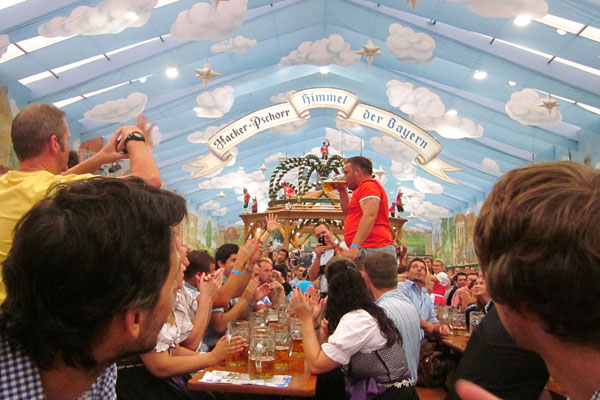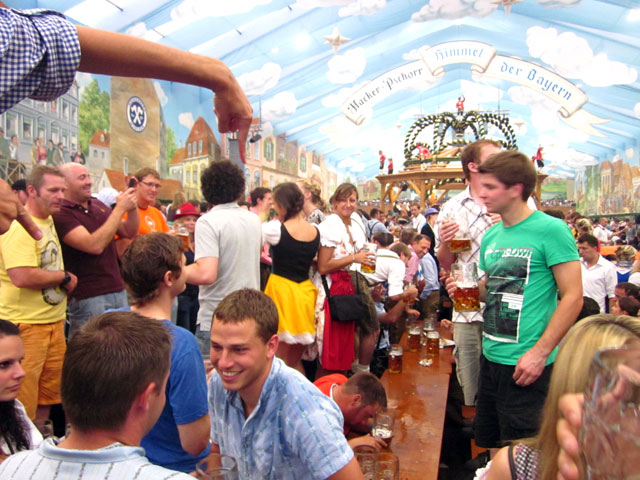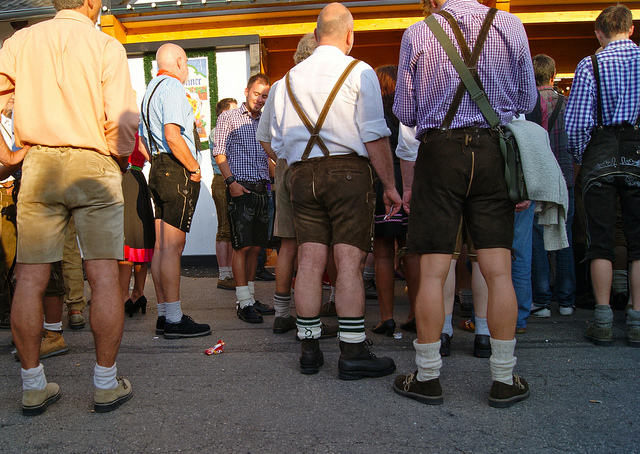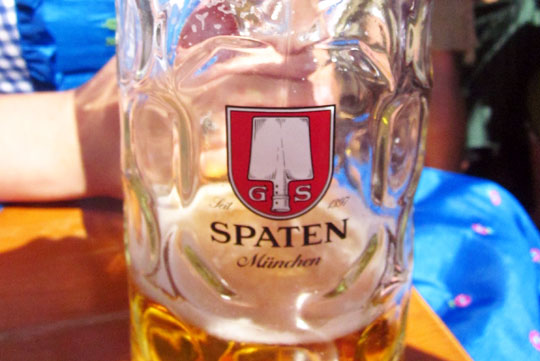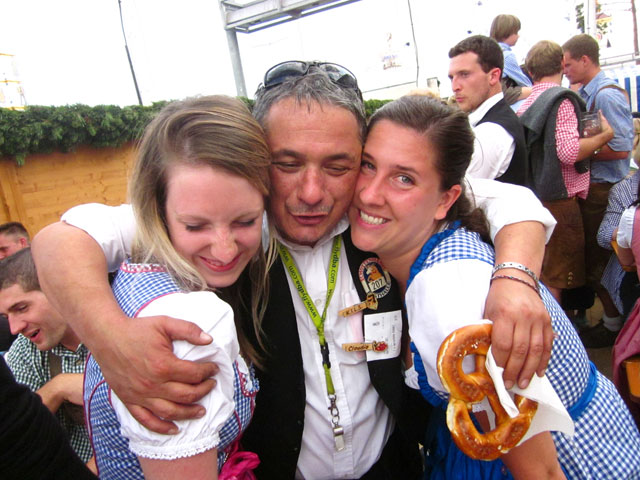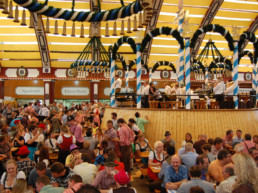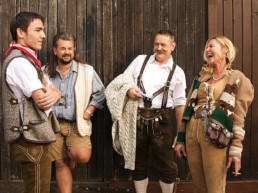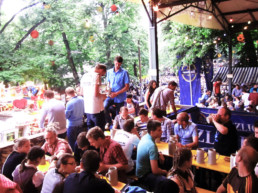As one of the biggest parties in the world, Oktoberfest is often idealized as a carefree and crazy German experience, which is exactly why it attracts so many visitors year after year. While it definitely can be all of these things and provide an unparalleled experience, first timers should align their expectations with the realities of Oktoberfest to ensure their visit is everything they want it to be – especially as many plan far in advance and shell out a considerable amount of money to set it all up. While I’ve already provided some practical pointers last year, here are some of the realizations I’ve made during my Oktoberfest experiences that I wish I’d known the first time around.
It’s going to be a really long & exhausting day.
Every year it seems that you need to go earlier and earlier to secure a spot in one of the tents, especially on weekends where people start lining up before 6am. But it’s becoming a requirement to go increasingly early on weekdays as well. Factor in that many have to travel from areas surrounding Munich or, at the very least, the greater Munich metropolis, and you’re likely to rise before the sun does. I will never forget running down the hill at the end of my street at 4:30am to catch the first tram to the train station for the 90 minute trip to Munich from Ulm to ensure we made it into a tent on the opening Saturday of Oktoberfest. We didn’t, but you’ll have to wait until the end to find out why.
Once you arrive on the grounds, you’ll most likely have to wait in line at your chosen tent for a couple of hours until it opens. Actually, it’s more of a mass gathering outside the tent doors, which contracts at every slight indication of being let in, completely eliminating any personal space and forcing you to get closer to strangers than would ever be appropriate in any alternative situation. As soon as the gates are metaphorically lifted, it’s a mad dash to find an open table as the masses file into the tent from its multiple entrances. So once you’re settled at your table, you’ll probably have to wait a bit more for your first beer. The beer starts flowing at 9am on weekends, 10am on weekdays, and noon on the opening Saturday but don’t forget that you’re competing with 5,000+ people to get one of the first rounds.
It’s important to pace yourself.
(Before)
You’ve put in your time and eagerly awaited for your Oktoberfest experience to officially begin which it does when you’re finally awarded with your first stein. Naturally you’re excited given everything you’ve done to get to this point. So are some of the other beer loving patrons who entertain the crowd by jumping up on the bench, putting one foot on the table, and chugging back their entire litre. That’s more than two pints consumed in under ten seconds, and if it takes a bit longer or you show any sign of struggle, you’ll be mercilessly booed by every single person in the tent. If you do complete the chugging challenge successfully (and can keep it down), you’re going to be feeling the effects pretty quickly and be well on your way to inebriation. All before the time that it’s legal to drink in many countries.
(After)
Even if you’re prudent enough not to try to set a record for chugging the most steins, having an entire day dedicated to drinking strongish beer will inevitably mean you’re going to consume a lot of the stuff. If you’re in a tent, you’ll likely receive your first beer by 9:30am and with a closing time of 11:00pm, you’ll have to pace yourself if you want to make it through most of the day. To ensure longevity, switch up your beverage every now and again. Radler, a half beer half lemonade mixture, is a good & refreshing alternative. Of course there are water and soft drinks as well but, fair warning, they cost nearly as much as the beer. Also, to improve your chances of seeing the day through to the end, make sure that you eat consistently. The great thing about Bavarian food is that it’s pretty hearty, soaking up all that beer so that you don’t end up as what the German’s call a “beer corpse”.
It might not be the German experience you think it’ll be.
While the historical Oktoberfest was based upon German traditions and emphasized the regional culture, it has morphed into more of an international party fest. Visiting on weekdays will provide a much more authentic German experience, where you’ll see a higher local to foreigner ratio than on the weekends. Many Germans avoid the festival’s peak times (with the exception of the younger generations – beer drinking age is 16) as mass binge drinking – and all that goes with it – isn’t common in their culture. On a pleasant day, the beer gardens will usually be more locally oriented than inside the tents where you may be so lucky as to encounter lederhosen clad children and homemade picnics being shared amongst a table. The tent you choose will also impact how ‘German’ your experience is. Paulaner, Löwenbräu and Augustiner tents are where you are most likely to hear more native German than any other languages.
As the day goes on, tent-goers transition from sitting pleasantly at the tables to standing on the benches, swaying their steins with, and singing along to, the lively music of the full brass oompah band. Everyone gets into the classic Deutsch songs so familiarize yourself with them ahead of time, especially my favourite: “Fliegerlied“. If you don’t get all the lyrics the first time, don’t fret. You’ll have plenty of opportunities later as the top songs are played on heavy rotation. Later in the evening, as the beer is increasingly sloshed around, the lights are dimmed, the rowdiness is intensified, and the songs played are some you likely already know quite well – “Take Me Home, Country Road”, “Sweet Home Alabama”, and “YMCA”.
You’ll regret not dressing the part.
Once upon a time, the majority of non-Bavarian visitors wouldn’t give their non conformist outfits a second thought. Nowadays, you will see the typical Bavarian dress widely on display at this festival, not particularly because of its lengthy tradition, but also due to its recent resurgence in popularity, especially amongst younger generations. First time Bavarian visitors are also increasingly dressed in the traditional garb, getting more into the festivities as a result.
For guys, lederhosen is the standard attire and comes in many iterations ranging from the expensive (suede) to the more affordable (cloth). If you don’t want to shell out for the real deal, at least try to incorporate the synonymous checkered shirt. For the girls, the dress is called a dirndl and it gives the wearer that whole ‘beer wench’ look. The dirndl comprises the dress and apron and can be found in a magnitude of colours and patterns but don’t forget to pick up the pouffy white top worn underneath. Lederhosen and dirndls can be found all over Munich leading up to and during the festival, starting around €75.
Things can go quite wrong when you drink that much beer.
Injuries, lost belongings, and misplaced friends come with the Oktoberfest territory. The large steins are made of thick glass and can cause serious harm if a prost goes wrong crushing your fingers or an empty glass breaks its fall on your foot. On that note, avoid sandals and open toe shoes at all costs and watch where you sashay your stein.
If Oktoberfest proves anything, it’s that the more one drinks, the less attention one pays to their crap. The lost & found stats from last year explain it all: 950 passports, 570 wallets, 480 cell phones, 2 wedding rings, 2 license plates, a hearing aid, a baby monitor, and a ping pong paddle all found through the 16 day event. Hopefully your one takeaway from this is to leave anything important in a safer place than in a large area in close proximity to thousands of drunken strangers.
Just as Disney World has a section for lost kids, so should Oktoberfest for missing drinking companions. The large grounds are disorienting, exacerbated by the excessive amount of people crowded within its boundaries and the amount of beer set crowd has consumed. A trip to the bathroom can be disastrous if you’re not alert as to where you’re going and, better yet, how to get back to your one bench in a mass of hundreds. And just like in grade school, stick with your buddy.
If things don’t go exactly as planned, just roll with it.
So you’ve tampered your expectations and followed all of the rules, but your Oktoberfest experience just isn’t working out as you want it to. Backtrack to my earlier exploit – after waking before 4am, traveling to Munich on the first high speed train which was delayed over an hour, waiting in the rain for 2+ hours outside a side door to one of the tents, we were informed that the tent was at capacity and closed for the day. Disappointment set in as we realized that we gambled on the wrong entrance. We had no choice but to find a spot in one of the gardens and lucky for us, the sun came out soon after to make the 3 hour wait until the first beer was tapped on the opening day of the festival considerably more pleasant.
While we had been told that the true Oktoberfest experience occurred in the tents, we made the most of our time outside which ended up being fantastic. The pace was more low key but it was also a perfect introduction to the festival as we met tons of Bavarians who took us under their wing. Hours later, our server, whom we’d been friendly to and tipped generously, made our night by getting us into the tent despite the closed door policy. Just goes to show you that if you make the most out of the situation, it’ll usually work out as it should in the end.
For more on Oktoberfest, check out our postt: Oktoberfest Für Dummies: A Guide to the Best Bavarian Beerfest
Additional photos courtesy of Flickr, SteFou!; evocateur; shlomp-a-plompa
Make your next trip the best one.
Departful is a full service travel agency creating truly exceptional travel experiences that are 100% personalized to you. Wherever you’re going, whatever your interests, we help you plan the perfect trip.
Lauren
Lauren co-founded Departful in 2012 and is the Managing Director of Departful Media. Since then she has worked between North America and Europe and has published content in partnership with a variety of tourism boards and businesses based around the world. Lauren is currently based in Toronto, Canada.


